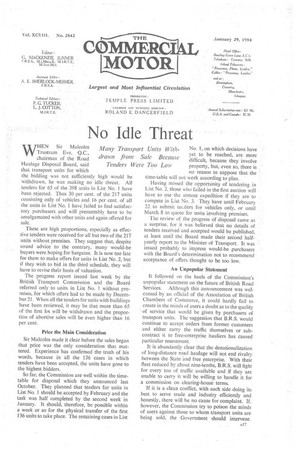No Idle Threat
Page 19

If you've noticed an error in this article please click here to report it so we can fix it.
Many Transport Units With drawn from Sale Because Tenders Were Too Low Sir Malcolm Trustram Eve, Q.C., chairman of the Road Haulage Disposal Board, said that transport units for which
the bidding was not sufficiently high would be withdrawn, he was making no idle threat. All tenders for 65 of the 398 units in List No. 1 have been rejected. Thus 30 per cent. of the 217 units consisting only of vehicles and 16 per cent. of all the units in List No. 1 have failed to find satisfactory purchasers and will presunrably have to be amalgamated with other units and again offered for sale.
These are high proportions, especially as effective tenders were received for all but two of the 217 units without premises. They suggest that, despite sound advice to the contrary, many would-be buyers were hoping for bargains. It is now too late for them to make offers for units in List No. 2, but if they wish to bid in the third schedule, they will have to revise their basis of valuation.
The progress report issued last week by. the British Transport Commission and the Board referred only to units in List No. 1 without premises, for which offers had to be made by December 21. When all the tenders for units with buildings have been reviewed, it may be that more than 65 of the first lot will be withdrawn and the proportion of abortive sales will be even higher than 16 per cent. Price the Main Consideration
Sir Malcolm made it clear before the sales began that price was the only consideration that mattered. Experience has confirmed the truth of his words, because in all the 136 cases in which tenders have been accepted, the units have gone to the highest bidders. So far, the Commission are well within the timetable for disposal which they announced last October. They planned that tenders for units in List No. 1 should be accepted by February and the task was half completed by the second week in January. It should, therefore, be possible within a week or so for the physical transfer of the first 136 units to take place. The remaining cases in List No. 1, on which decisions have yet to be reached, are more difficult, because they involve property, but, even so, there is no reason to suppose that the
time-table will not work according to plan.
Having missed the opportunity of tendering in List No. 2, those who failed in the first auction will have to use the utmost expedition if they are to compete in List No. 3. They have until February 22 to submit tei,ders for vehicles only, or until March 8 to quote for units involving premises.
The review of the progress of disposal came as a surprise, for it was believed that no details of tenders received and accepted would be published, at least until the Board made their second halfyearly report to the Minister of Transport. It was issued probably to impress would-be purchasers with the Board's determination not to recommend acceptance of offers thought to be too low. An Unpopular Statement It followed on the heels of the Commission's unpopular statement on the future of British Road Services. Although this announcement was welcomed by an official of the Association of British Chambers of Commerce, it could hardly fail to create in the minds of users a doubt as to the quality ' of service that would be given by purchasers of transport units. The suggestion that B.R.S. would continue to accept orders from former customers and either carry the traffic themselves or subcontract it to free-enterprise hauliers has caused particular resentment.
It is abundantly clear that the denationalization of long-distance road haulage will not end rivalry between the State and free enterprise. With their fleet reduced by about nine-tenths, B.R.S. will fight for every ton of traffic available and if they are unable to carry it will be willing to handle it for a commission on clearing-house terms.
If it is a clean conflict, with each side doing its best to serve trade and industry efficiently and honestly, there will be no cause for complaint. If, however, the Commission try to poison the minds of users against those to whom transport units are being sold, the GovernMent should intervene.












































































